|
840 WHAS |
|
WHAS Ink |
WHAS Surveys |
WHAS Photos |
WHAS Audio Interviews
|
WHAS Airchecks
| WHAS Video
Kentucky
Derby Airchecks |
WHAS 1974 Tornado
Coverage | WHAS
Jingles |
WHAS-AM
History
WHAS Trivia: WHAS applied for
500 kilowatt authorization (10 times its current power) in the mid 1930s,
but was denied by the FCC due to the proximity of WLW in Cincinnati, which
was already experimenting with "superpower."
Current WHAS afternoon drive host Terry
Meiners joined the station from WQMF after waiting out a six month
non-compete clause that started on June 1, 1985. On Sunday, December 1,
1985 he appeared as a guest on Doug McElvein's "Sunday Morning Talk Show."
Terry's first actual "Terry Meiners & Company" program aired the next
afternoon.
Barry Bingham,
Sr. February 12, 1986 Letter
Joe Donovan Tribute
Page |
|
Know
anything more about this station? Have any WHAS airchecks, photos or
promotional material?
Drop us a line. |
|
WHAS Ink |
|
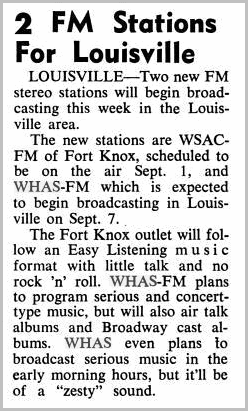
From the September 3, 1966 Billboard |
|
Courier-Journal Article
- March 14, 1973
'Topless' radio in Louisville?
By Howard Rosenberg
The nation's topless radio baron is Los
Angeles disc jockey Bill Ballance, who has graphic discussions about sex
with listeners on his extremely popular show, "Feminine Forum." Other
large cities have similar radio shows.
Now, people keep telling me that topless
radio has come to Louisville.
"I just can't believe what I have been hearing on the radio," goes the
usual complaint. They say it's too provocative.
I decided to find out for myself exactly what was being cooked up by
Louisville's two alleged provocateurs, Dude Walker of WAKY (790) and Dave
McCree of WHAS (840).
Each devotes an hour of his show to phone-in responses to a question about
a topic that often has some sort of sexual implication. Listeners'
comments are wedged between records.
Walker's question yesterday was: "How do you feel about couples who choose
not to raise a family?"
The most provocative answer came from a listener who felt that such
couples were "poor, selfish, unloving persons." Somehow I restrained my
urge to blush.
He goes to church.
I called Walker and demanded to know why
he tried to be so provocative. He insisted he didn't. "I'm not a
provocative person," he said. "I'm not a puritan, but I go to church every
Sunday."
Walker said he doesn't always present sex-related questions. For example,
he once asked for opinions on whether the United States should give
financial aid to North Vietnam while refusing to grant amnesty to draft
evaders.
However, the greatest response is elicited by "adult-oriented" issues such
as "the importance of virginity in marriage." Walker said, "I don't do
this for sensationalism. I do it because I'm a little upset myself about
the way things are."
I hung up with the feeling that Walker was inspiring and unprovocative.
McCree's topic yesterday was: "What are your suggestions for reducing the
rising traffic jams."
'There are a lot of
dodos'
The most provocative exchange came when a
woman complained that too many motorists tailgated, and McCree replied:
"Listen, dear, there are a lot of dodos on the road."
Only last week, McCree had asked listeners about their blind dates, and
sex did not once come up in the ensuing dialogue.
Of course, McCree does have a weakness for speaking to female callers in
such familiar terms as "dear," "love" and "beautiful." I demanded to know
why he was engaging in such disgracefully provocative behavior. "That's
the way I am," he replied.
Then he spilled out more of the story. "Originally, Hugh (Barr, radio
station manager) wanted us to discuss it (sex). For the first month or so
(McCree has been doing his present early-afternoon show since January,
after being moved from the all-night shift) I was doing a lot and it was
getting a lot of response. But I got away from it, because you can't do it
and tiptoe through the tulips."
McCree left the impression that he would prefer to do more stomping.
Sill, he does ask his audience a sex-related question once or twice a
week. He says some of them have been: "Who gives more love, men or women?"
"What makes a woman sexy?" "What would your reaction be if you found out
your teen-age son was using contraceptives?"
And a pat on the back.
McCree says he has had no negative
response from listeners to this sort of material and, in fact, "two
priests, a minister and a nun" called to give him a pat on the back.
"I don't try to be provocative," he said.
All of McCree's questions must be okayed by Barr, who admits that WHAS has
done "a little experimenting" with McCree's show. He said he wanted to
continue the phone-in segment's swing away from sex-for-sex's sake to
social issues.
He grimaces at the topless concept, calling it "radio with a tear --
talking as dirty as you can and still getting away with it. A Cosmopolitan
magazine of the air."
Though he acknowledges the validity for discussion of moral issues," he
wants to avoid "getting into areas where our guys are not experts. I think
we're just in dangerous waters there."
Topless radio never will come to WAVE (970) vows Jim Caldwell,
vice-present and station manager. I asked Caldwell why he was being such a
stuffed shirt about topless, and he replied:
"It encourages exhibitionists and all kinds of nut-fringe people to call
in. It's slopped over into bad taste and it's pretty hard to control," He
said he was not talking about Louisville stations.
Caldwell thinks the Federal Communications Commission (FCC) eventually
will "crack down" on topless radio. And Sen. John O. Pastore, D-R.I.,
Chariman of the Senate communications subcommittee, is urging just that.
After reading a newspaper account of Balance's, lusty topless show,
Pastore is said to have declared: "This is awful."
However, Louisville radio is in no immediate danger of catching a chill
from being topless. Compared with what is being broadcast in some other
cities, it is wearing long red underwear.
 |
|
Courier-Journal Article
- March 22, 1973
WHAS Radio 'Releases'
By Howard Rosenberg
This and that…
A change in early afternoon broadcasters at WHAS (840) has left Dave
McCree looking for a job.
McCree, who had been holding down the mike 12:30 p.m. to 3 p.m. during the
week, is now out. Last Friday was his last day on the air.
"Through mutual agreement Dave has left the station," said Hugh Barr, WHAS
radio's station manager. Barr declined to elaborate.
Reached at home, McCree said, "I lost my job Friday. I was released."
McCree said he and Barr "always had a conflict of personality. There's
always been tension there.
"My ideas in programming conflicted with Hugh's. It's nothing demeaning.
It's the honest truth." McCree added that he doesn't "hold any malice"
about leaving WHAS.
Meanwhile, the man hired to succeed McCree is scheduled to join WHAS
Monday and will gradually move into McCree's early afternoon time period,
according to Barr.
He is Jack Fox, 32, who has spent the last four years at KOA in Denver,
Colo. Fox also has worked for a station in Kansas City, Mo.
Fox's parents live in Henderson, Ky., and his wife's parents in
Evansville, Ind.
McCree, 27, was hired by WHAS in March 1970, and almost immediately was
given the all-night music shift, which he continued to hold until last
January. He was replaced by "The Herb Jepko Show," a phone-in talk program
originating in Salt Lake City, Utah.
The switch of McCree to early afternoon resulted in his air time being
timed to 2 1/2 hours and his autonomy being restricted.
Various other WHAS personalities have been taking over for McCree this
week and will continue to fill the time period until Fox moves in. |
|
.jpg)
[Click
to enlarge] |
|
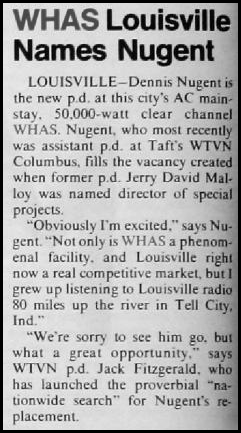
From the March 5, 1983 Billboard |
|
Courier-Journal Article
- June 11, 1986
Since 1922, WHAS has turned its dial to firsts and awards
By Vince Staten
Staff Writer
Yesterday's sale of WHAS radio is not the
first time the station has been sold.
In 1948 Barry Bingham Sr. reached an agreement with Crosley Broadcasting
of Cincinnati to sell the station for $1.925 million.
The reason for selling, Bingham said then, was the advent of television.
"Television will perhaps change the nature of radio in the United States."
But a year later the Federal Communications Commission refused to approve
the sale, because WHAS' signal overlapped with that of Crosley's
Cincinnati station, WLW.
There were other suitors for the station, including comedian Bob Hope, but
the Binghams decided to keep the station.
They had started it in 1922 when an estimated 19,000 stations were on the
air nationwide. Most were amateur operations broadcasting sporadically;
439 were commercial stations. But none of the latter was in Kentucky.
Judge Robert Worth Bingham, owner of the Courier-Journal and Louisville
Times Company, determined to do something about that:
"I want a radio station which will reach into the farthest confines of the
station, where a man may string an aerial from his cabin to the nearest
pine tree, and sitting in his chair before the fire, have a pew in a
church, a seat at the opera, a desk at the university."
He applied to the Commerce Department, the governmental agency then
handling radio licensing, and in April 1922 then-Commerce Secretary
Herbert Hoover awarded Bingham a license for radio station WHAS. The
letters didn't stand for anything; they were selected at random by the
Commerce Department.
The station began practice transmissions July 15, 1922, from an antenna on
the roof of the CJ&T building.
William Tapp of Upper River Road reported he picked up the signal loud and
clear on his improvised antenna - 25 feet of clothes line.
Three days later WHAS-AM went on the air with these words from station
manager and announcer Credo Harris: "This is WHAS, the radio telephone
broadcasting station of the Courier-Journal and Louisville Times of
Louisville, Kentucky." Initially WHAS was on the air only 2 ½ hours a day.
On September 14, 1922, the station had a national first; the first
broadcast to a moving train.
The station's first remote broadcast came in December 1922 - a broadcast
of organ music from the old Alamo Theatre in Louisville.
By the end of that year the station had received almost 30,000 letters
from listeners, some living as far away as Spanish Honduras and Sydney,
Australia.
Because of its strong commitment to music - the station had produced 3,006
performances during its first six months - it was ranked as one of the six
foremost stations in the country.
WHAS' first brush with notoriety occurred August 22, 1924. The station
gave some Kentuckians a scare with a broadcast of a Fort Knox mock battle.
Many thought Martians had landed. (Fifty years later the station would
again send its listeners looking for cover with a rerun of its tornado
coverage.)
The station ran its first commercial October 20, 1925. The Chicago
advertiser offered three free cigars to listeners. The response was so
overwhelming that a week later the company sent an urgent wire to WHAS
cancelling its ads: "For God's sake, quit."
Here's a closer look at other important dates in the station's history:
- May 30, 1925: The first
Kentucky Derby Broadcast.
- May 15, 1928: WHAS became a
part of the CBS network.
- May 20, 1928: The station
attracted attention with a flagpole-sitting stunt. "Shipwreck" Kelly
mounted the antenna for a four-day sit. He came down 100 hours later,
and boxed two rounds before leaving town.
- October 4, 1932: WHAS increased
its power from 5,000 to 25,000 watts. Two months later it jumped the
power to its present 50,000 watts.
- 1936: The station began
carrying University of Kentucky basketball and football games.
- April 24, 1937: WHAS was
awarded the CBS Medal for Distinguished Service for its overage of the
January floods.
- 1939: WHAS' newscasts were
recognized as one of the five best radio newscasts in the nation.
- March 1941: The station shifted
its signal on the dial to the present 840.
- 1954: WHAS radio and television
establish the Crusade for Children which Vic Sholis, who held management
positions from 1947-1975, calls the crowning achievement of his years at
the station.
- 1959: The station dropped the
CBS radio network because of what Sholis calls a "policy disagreement."
"Programming became a challenge then," he said. Programs created during
this period included "Coffee Call" and a talk show called "Juniper
5-2385." "Juniper 5-2385" is still running under the title "Metz Here."
- March 1963: The station
affiliated with ABC radio. (It rejoined CBS several years later.)
- 1969: Wayne Perkey became the
morning deejay.
- March 1970: WHAS began
broadcasting 24 hours a day.
In 1971 it began what then-station
manager Hugh Barr called "a five year plan" to bring WHAS into the '70s.
The plan climaxed in 1976 with the hiring of high-energy rock deejay Gary
Burbank to liven up its afternoon air shift.
Over the years the station has won many national awards.
In 1953 it won an Alfred I. du Pont award for public service. Two years
later it won a second du Pont, this time for its community service
schedule.
In 1982 WHAS radio news won an Ohio State award and a Du Pont Columbia
award for a documentary.
In 1983 it won a Radio Television News Directors Association award for
spot news coverage of the sewer explosion.
In 1984 it won the Edward R. Murrow award for excellence.
In 1985 there was the Robert F. Kennedy Award for coverage of the
disadvantaged.
This year it has won a George Peabody Award for community service for a
documentary on the homeless and an Eclipse award for coverage of
thoroughbred racing.
WHAS-AM's sister station - WAMZ-FM - also has achieved distinction.
The Binghams first received a permit for an experimental FM station,
designated W9XEK, in May 1944. Two years later the permit was changed to a
license, and the station, WCJT, became the first FM station in the South.
It lasted for four years playing "good music," but was a commercial
disaster and in 1950 WHAS turned the license back in to the FCC.
"FM wasn't getting anywhere in terms of building an audience," recalls
Sholis.
"We lost our shirt," says Barry Bingham Jr., vice chairman of WHAS Inc.
Fifteen years later WHAS decided to try the FM market again. In 1966 it
obtained a license for WHAS-FM, a classical music station. The station
again lost its shirt on the FM band - a "different shirt," says Bingham -
and in 1975, WHAS-FM became WNNS-FM, an all-news station.
Again a noble effort, again a financial disaster, and on February 28,
1977, WNNS-FM became WAMZ-FM. The "AM" stood for America's Music," but it
could just as easily have stood for "Automated Music." The country music
was untouched by human hands.
In February 1980, Coyote Lee Calhoun became the station's first live
announcer. Soon the automation equipment was gone and WAMZ was all live.
And the ratings began an upward surge that has kept the station at or near
the top of the ratings every since.
In April 1986 WAMZ was named Country Radio Station of the Year by the
Academy of Country Music. |
|
Lexington Herald Leader Article - October 17, 1989
WHAS Announcer enjoys his work
Skits that spoof Kentucky Personalities
charm audiences
By Glen Rutherford
Herald-Leader Louisville bureau
LOUISVILLE - The day may come when Terry
Meiners has to get a real job.
One afternoon somewhere down the road, he might decide that going on the
radio and making fun of everyone from the governor to former Gov. A.B.
"Happy" Chandler to former Coach Joe Beasman Hall and WVLK's Ralph Hacker
just isn't the hoot it used to be.
He thought about that for a moment recently just before his afternoon
drive-time stint on WHAS-AM (840), a station that's easily heard in
Lexington.
"I know I won't be doing this when I'm 40," said Meiners, 32.
"I know that one of these days I'm going to have to do something
different."
But not now.
Now, he and companion-in-comedy Randy Davidson are putting together the
funniest four hours on Louisville radio, five days a week.
Meiners realizes that compared with most people his age who dropped out of
the University of Kentucky after a year or so, he's having a fine old
time.
He knows that making fun of people on the radio beats the dickens out of
heavy lifting. His mama and daddy, he'll tell you, raised 14 boys and
girls, and they didn't raise any fools.
So Meiners, a man of above-average height with a razor-sharp,
above-average wit, will likely stay on the radio a good bit longer. He's
having too much fun and making too much money -- $100,000 a year -- to do
anything else.
"Every once in a while, somebody calls from Detroit or Boston or someplace
like that," he said recently before air time. "And I had a call recently
from somebody who was looking for talent for NBC. I listen to those
people, but I've got it great here. I love it. This is home, and my
family's here, and I'm having a great time."
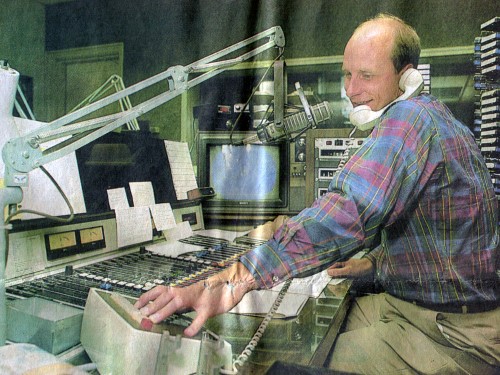
Terry Meiners in the WHAS Control Room
(October 1989)
Take October 4, for instance. Meiners
usually goes into the WHAS studios about noon and types out an outline of
the routines that he and Davidson will record for that day's show.
Davidson, a producer and copywriter at the station, does many of the voice
caricatures and fictional characters on his 3 to 7 p.m. daily silliness.
It's Davidson, for instance, who's the voice of paranoia-racked Joe
Beasman Hall -- a man convinced that everybody likes the Chicago Cubs
because they stole the team color of his beloved UK Wildcats.
"Hey, what's a baby Wildcat called anyway?" the Beasman asked Meiners that
afternoon. "Yeah, dadgummit, a cub! They even stole our name."
On this particular day, Davidson not only does the voice of Hall but also
throws in imitations of former heavyweight boxing champ Muhammad Ali; a
now-out-of-work Eddie Sutton, another former UK basketball coach; and a
fictional redneck named Tucker Flood, "from out here in Peeeee Weeee
Valley!"
But Meiners had spent most of his time talking to a reporter, so that
today's outline wasn't as complete as it usually is. Still, given the idea
for the bit -- that Hall is upset over the Cubs' popularity and all the
attention baseball is getting -- Davidson ran with it.
Halfway through the taping, both men were in stitches.
Heck, they know they're funny; they're hooting and hollering and shaking
their heads. It's hard to believe people get paid for having this much
fun.
"He's had this idea in his head for, what, 15 minutes, and he's already on
a roll," Meiners said, pointing to Davidson.
"Grown men. We're grown men, and this is the way we're making a living,"
Davidson said between giggles. "Gosh, we love it when the Beasman gets on
a roll."
They're taping on the day of Secretariat's death, and in another bit --
they usually record four a day -- Meiners does the voice of Chandler. In
the routine, Chandler calls to take credit for the Triple Crown winner's
success.
"I'm the guy who got that horse started," Chandler wheezed. "I called them
people at Churchill Downs and told them about this colored horse I knew.
Before that, all they had was white horses running. White horses race
after race. But I told them about this brown horse, Secretariat, and there
ain't been a white horse in a race down there since. All them colored
horses are running because they're faster. They've got that extra muscle
in their legs or something, and I just want the young people to remember
what I did."
"Gimme that phone, you crazy old white man," whispers the voice of Ali.
Before it's over, everyone in the studio is laughing and in tears.
Meiners, who began polishing his comedy routines while working at WKQQ-FM
in Lexington in 1975, said he reads USA Today, the Courier-Journal and the
Herald-Leader looking for topical things to make light of. He avoids
depressing and controversial questions; there are no jokes about abortion,
for instance.
But if you're a politician, look out.
"I don't like to be mean to regular people," he said, "but I don't mind
picking on a politician because, well, they deserve it so much."
Most of them are moochers, Meiners said, who make all kinds of promises
during their election campaigns. Once they're in office, they revert to
lining their pockets and planning re-election campaigns, he said.
Meiners does the voice of Gov. Wallace Wilkinson, who's portrayed on the
show as a backwoods, tobacco-chewing buffoon who likes road-kill dinners
and prefers an outhouse to indoor plumbing.
All the governor bits include a background of banjo music from the movie
"Deliverance".
The governor's caricature is served by a sycophantic WVLK general manager
Ralph Hacker -- a syrupy-voiced lackey portrayed by Davidson, who once
worked for Hacker at WVLK in Lexington.
"I decided to do Hacker after he did some ads for Wilkinson," Meiners
said. "He betrayed a broadcaster's sacred trust, in my mind. Broadcasters
aren't supposed to take sides; when he did, I decided to let him have it."
The real Wilkinson is well aware of the barbs Meiners has thrown his way.
Seems to take them in good humor, too, the disc jockey said.
"I'll never forget one time we came face to face," Meiners recalled. "We
were at the NCAA basketball tournament a year or so ago, and we were right
in the middle of the U of L section. I was talking to the mayor (Jerry
Abramson), and he introduced me to the governor."
It was like one of the old E. F. Hutton TV commercials, Meiners said. The
whole section seemed to pause, lean closer and listen for what the
governor might say to his tormentor.
"And Wallace said, 'Tell me, just have I ever done to ---- you off?'" |
|
 |
|
WHAS Surveys |
|
June 24, 1973 |
July 8, 1973 |
|
July 22, 1973 |
August 5, 1973 |
|
September 2, 1973 |
November 11, 1973 |
|
November 25, 1973 |
December 23, 1973 |
|
June 25, 1984 Playlist |
|
Top 840 of All Time - Part 1 |
Top 840 of All Time - Part 2 |
|
Top 840 of All Time - Part 3 |
Top 840 of All Time - Part 4 |
|
Top 840 of All Time - Part 5 |
Top 840 of All Time - Part 6 |
|
Top 840 of All Time - Part 7 |
Top 840 of All Time - Part 8 |
|
Top 100 of 1984 - Part 1 |
Top 100 of 1984 - Part 2 |
|
 |
|
WHAS
Audio Interviews |
|
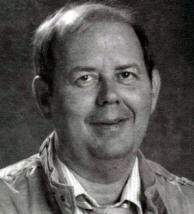
Joe Donovan
Joe Donovan came to WHAS in 1977 and was
part of the air staff for 20 years. Most of those years were spent
overnight doing an oldies show that not only was popular in the Louisville
area, but across the country thanks to WHAS' 50,000 watt clear channel
signal. On November 11, 2009 we spoke with the retired Donovan about his
time at the Big 84, where he worked in radio before and after WHAS, the
work that went in to producing a typical Joe Donovan oldies show, whether
he'd like to return to doing a regular radio show, and more.
Joe Donovan Audio
Interview
22:51 - 8034 KB |
|
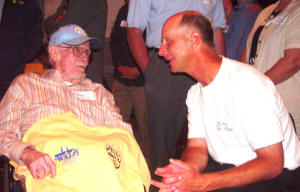
Bill Bailey and Terry Meiners (July 2005)
On February 27, 2007 we had
the pleasure of telephonically interviewing veteran WHAS PM drive air
personality Terry Meiners. Terry shares why he originally wanted to pursue
radio as a career; about his early radio days in Lexington at WKQQ; about
teaming up (and breaking up) with Ron Clay at WLRS and WQMF; the stories
behind the transitions from one Louisville station to another; how he
prepares for his afternoon show at WHAS; and the Terry Meiners-Bill Bailey
connection.
Terry Meiners Audio
Interview
47:56 - 16,858 KB |
|
The folks at
Old Gold Radio
interview former WHAS Radio and TV air personality Ray Shelton in 2009.
Ray Shelton Audio
Interview
49:19 - 17,343 KB |
|

|
|
WHAS Airchecks |
|
WHAS
Airchecks Page |
|
 |
|
WHAS Jingles |
|
WHAS
Hugh Heller Jingles
:36 - 286 KB |
|
WHAS
Early 70s TM Productions Jingles
14:12 - 6656 KB |
|
WHAS
TM Winning Score Jingles
4:27 - 2090 KB |
|
WHAS
TM Good Feelings Jingles
2:23 - 1121 KB
For more information on TM jingles, go to the
Jones TM Website. |
|
WHAS
JAM Dimension Two Jingles
2:43 - 1275 KB |
WHAS PAMS Series 18 Contempo Jingle
:08 - 290 KB |
|
WHAS 1980s Jingle and ID
Montage
3:15 - 1524 KB
Note: The cuts that make up this montage
were dubbed from WHAS carts. Quality and levels vary. |
|
WHAS
JAM Dimension 2000 Jingles
2:00 - 1881 KB |
|
WHAS Joe Donovan JAM Jock Jingle
:11 - 175 KB |
WHAS Larry Smith JAM Jock
Jingle
:11 - 174 KB |
|
JAM Creative Productions'
Jon Wolfert does a weekly show (Sundays 3p-6p Eastern) on Internet
station Rewound Radio.
On December 9, 2018 he did a "Jingle Time" segment featuring the jingles
of WHAS, including those that contained the name of overnight oldies DJ
Joe Donovan.
Rewound
Radio WHAS Jingle Spotlight
6:15 - 8840 KB |
|
For more information on JAM jingles, go to the JAM Website |
|
All audio is in
downloadable MP3 format. |
